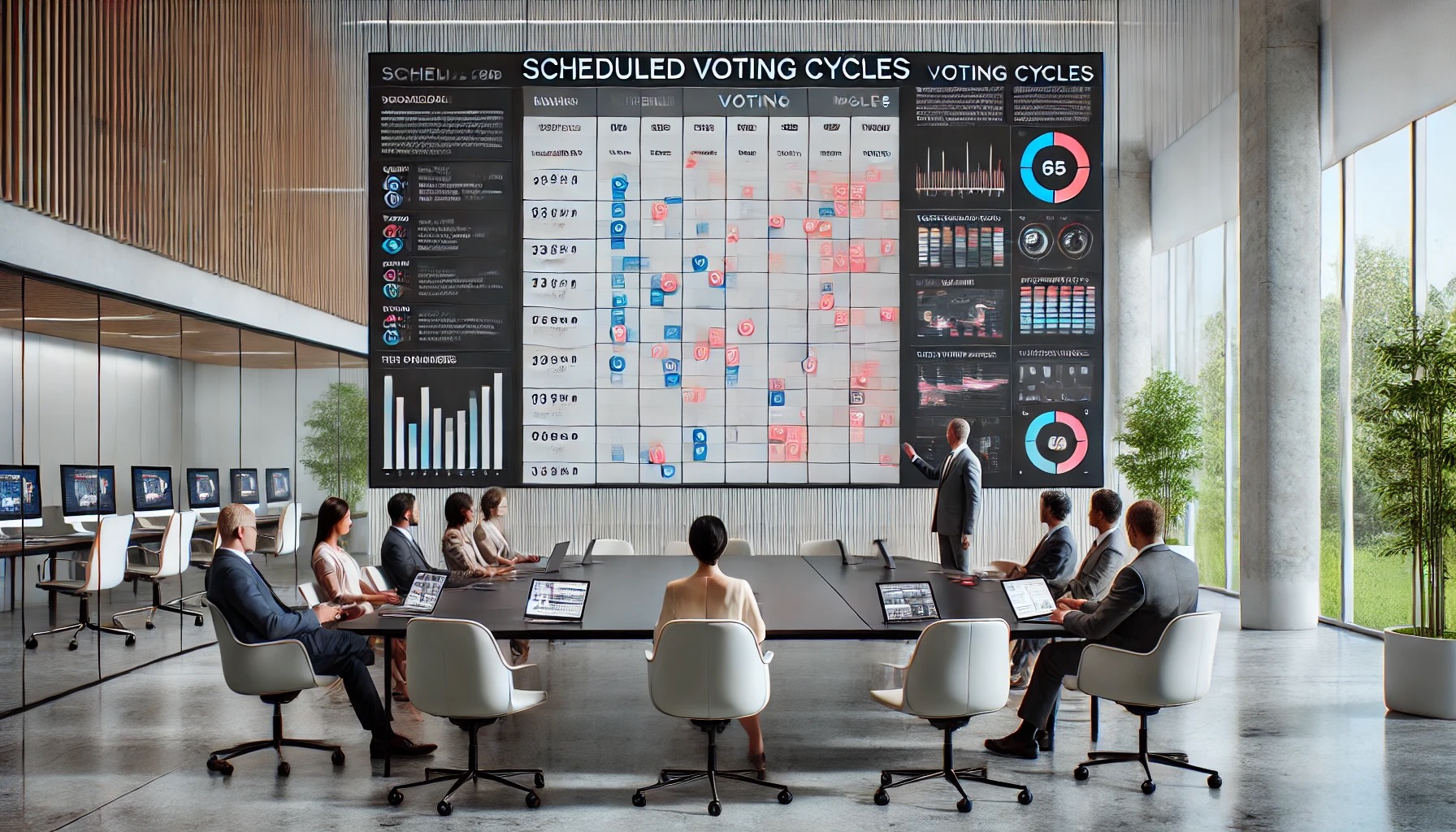DAOs offer a transparent, inclusive approach to decision-making, where delegates take on a critical role, representing the community’s interests, voting on proposals, and ensuring the organization’s direction aligns with its mission.
But there’s a side to DAO governance that’s not talked about enough: the reality of delegate fatigue.
If you’re a delegate, you know the feeling. The endless stream of proposals, constant voting rounds, and the mental gymnastics of understanding each decision’s implications. It’s fulfilling, yes, but it can also be incredibly exhausting. Staying engaged without burning out has become a serious concern for many delegates.
Delegate fatigue is the silent strain that accumulates over time, making it harder for even the most dedicated delegates to stay as sharp and motivated as they were on day one.
In this article, we’re going to dive deep into the causes of delegate fatigue, its impact on DAO governance, and explore some unconventional yet promising strategies for making delegate roles more sustainable. The goal? To create a governance ecosystem that values not only participation but also the well-being of those who serve as its lifeblood.
Causes of Delegate Fatigue
High Volume of Proposals: Too Much of a Good Thing
DAO governance thrives on the input and initiatives from its community, which is why proposals are at the heart of every DAO. Each proposal represents an opportunity for innovation, improvement, or change.
But as DAOs expand, the volume of proposals can become overwhelming. For example, since its inception, the Arbitrum DAO has voted on over 280 Snapshot votes and conducted 30 on-chain votes.
Each one demands attention, research, and consideration from delegates, many of whom may also serve in multiple DAOs simultaneously.
As the number of proposals increases, delegates face “proposal overload,” making it difficult to maintain the same level of engagement and due diligence across every vote. This overwhelming volume not only creates cognitive fatigue but can also lead to decision paralysis. With so many proposals, the mental effort required to review and process each one is substantial, leading to inevitable burnout for delegates who feel obligated to stay on top of every detail.

Complexity of Governance
DAOs operate in a complex environment where proposals aren’t always straightforward. They often include detailed technical, financial, and strategic considerations, requiring delegates to have a thorough understanding of various specialized areas.
For instance, some proposals may involve intricate technical updates, while others focus on financial strategies or community governance issues. This diversity is beneficial for the DAO but can be daunting for delegates who are expected to understand and weigh in on all fronts.
The high complexity of governance means that delegates must constantly update their knowledge and skills to make informed decisions. For delegates involved in multiple DAOs, this complexity multiplies.
The pressure to be an all-rounder—versed in every aspect of DAO governance—can lead to fatigue, especially when combined with the other responsibilities they have to juggle.
Lack of Predictability
One of the unique challenges of DAO governance is the lack of a predictable schedule for voting and proposal submissions.
Unlike traditional governance models, where decision-making often follows a set cadence, DAOs operate on a rolling basis. Proposals can pop up at any time, demanding the immediate attention of delegates. Without structured voting cycles, delegates face the uncertainty of when and how many proposals will require their input, making it difficult to manage their time effectively.
This inconsistency can create stress, as delegates must constantly monitor DAO activity to avoid missing important proposals.
In the case of Arbitrum DAO, community members have suggested structured voting periods to provide more predictability. Such measures can help delegates plan their schedules better, potentially easing the mental strain of constant, unpredictable engagements.
The Impact of Delegate Fatigue on DAO Governance
Delegate fatigue has broader implications for DAOs beyond individual exhaustion. When delegates experience burnout, the quality of governance declines. Fatigued delegates may resort to surface-level reviews or avoid voting altogether, leading to uninformed decisions and missed opportunities.
Furthermore, a high turnover of delegates due to fatigue means a loss of experienced voices, which can destabilize DAO governance and undermine the community’s trust in the process.
Fatigue can also contribute to “governance centralization.” As some delegates disengage, the decision-making power may become concentrated among a few active members. This goes against the ethos of decentralization that DAOs are built upon and can erode the diversity of perspectives that enrich decision-making.
Solutions to Combat Delegate Fatigue
Addressing delegate fatigue requires innovative strategies that go beyond traditional time management solutions. Here are some unconventional approaches that could make DAO governance more sustainable.
Specialized Delegate Roles
Standard delegation tools, like those provided by Gov3 and Karma, allow token holders to delegate their voting power to trusted representatives, thus reducing the workload on individual voters.
But what if DAOs took this a step further with a “multi-tiered delegation” system? Under this model, token holders could delegate their votes not just to a single delegate but to a network of specialist delegates based on expertise areas (e.g., finance, technical development, community relations).
By creating a structure where each delegate specializes in specific areas, DAOs can ensure that complex proposals are evaluated by knowledgeable individuals, reducing the pressure on generalist delegates. This model could reduce cognitive load, enhance the quality of decision-making, and ensure a more balanced distribution of responsibilities.
Dynamic Incentive Programs: Rewarding Engagement Quality
Incentives play a crucial role in keeping delegates motivated, and some DAOs, like Lido, have implemented programs that reward delegates based on their participation rates.
However, DAOs could consider more dynamic incentives that go beyond just attendance.
Imagine a system that rewards delegates not only for showing up but also for the quality of their contributions. For instance, a reputation-based points system could reward delegates for providing constructive feedback, engaging in meaningful discussions, or offering innovative ideas.
Additionally, DAOs could offer mental wellness stipends or even scheduled sabbaticals for long-standing delegates, allowing them to recharge without risking burnout. These incentive structures would promote a culture of sustainable engagement, recognizing and valuing the quality of contributions over sheer participation rates.
AI-Powered Insights and Asynchronous Updates: Smarter Information Management
Clear communication is essential in DAOs, but constant calls and notifications can add to delegate fatigue. By introducing AI-powered insights and asynchronous updates, DAOs can streamline information flow while reducing the need for live participation.
For instance, AI tools could automatically summarize proposal discussions, community sentiment, and voting outcomes, providing delegates with concise, actionable insights.
Asynchronous communication methods, like recorded updates and written summaries, can also reduce the pressure on delegates to attend every meeting. By allowing delegates to catch up on their own schedule, DAOs can promote a healthier approach to governance, minimizing the “always-on” expectation that often leads to burnout.
Scheduled Voting Cycles with Designated Decision Windows
The introduction of structured voting cycles has been suggested to manage proposal flows, but adding “decision windows” within these cycles could take it a step further. Decision windows are specific days within a voting cycle reserved for particular types of proposals, such as high-impact initiatives or community-wide matters, while other days are allocated for operational updates or minor adjustments.
This segmentation of voting days allows delegates to focus on specific areas at designated times, creating a rhythm that can prevent the scattered feeling of continuous voting.
For instance, the first Monday of each month could focus on financial proposals, while Wednesdays could be reserved for community-driven initiatives. This organized cadence can help delegates mentally prepare and plan their participation without becoming overwhelmed.

Delegate Wellness Programs: Supporting the Human Element
While DAOs are often tech-focused, the human element remains at the core of effective governance. Wellness programs within DAOs could support delegates in managing stress and building resilience.
DAOs could consider bringing in professional wellness resources, such as mindfulness training, virtual wellness sessions, or stress management workshops.
These programs not only enhance delegates’ mental well-being but also send a strong message that their contributions are valued beyond the votes they cast.
Delegate Rotations and Sabbaticals
An underused yet powerful approach to mitigating fatigue is the concept of delegate rotations and sabbaticals. By implementing a rotational system, DAOs can provide delegates with structured breaks.
For instance, after a set period, delegates could be offered a sabbatical, with other community members stepping in temporarily. These rotations ensure governance continuity while allowing long-standing delegates time to recharge and return with renewed focus.
Rotational cycles could align with natural pauses in DAO activity, such as after the close of a major project or voting season. This strategy fosters sustainability by balancing engagement with recovery, benefiting both the individual delegates and the DAO’s overall governance health.
A Vision for Sustainable DAO Governance
Delegate fatigue is a challenge that must be addressed for DAOs to thrive in the long term. Sustainable governance requires more than commitment; it needs structures and incentives that allow delegates to engage without sacrificing their well-being.
As DAOs continue to grow, the focus on delegate wellness and workload management becomes crucial not only for individuals but for the health of the entire ecosystem.
By adopting these innovative, delegate-centered approaches—multi-tiered delegation, dynamic incentives, AI-driven updates, wellness programs, and delegate rotations—DAOs can build a future where governance is not only effective but also sustainable.
This approach ensures that delegates feel valued, supported, and empowered to continue contributing meaningfully to the communities they serve.
The future of DAOs lies not just in the power of decentralization, but in creating an environment where everyone can contribute without burning out.
Together, we can build a governance model that respects both the dedication of our delegates and the ideals of decentralization, forging a path toward a more balanced, resilient, and effective DAO ecosystem.




评论 (0)